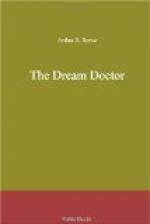Three feet farther away was a camera with a moving film of sensitised material, the turning of which was regulated by a little flywheel. The beam of light focused on the thread in the galvanometer passed to the photographic film, intercepted only by the five spindles of the wheel, which turned once a second, thus marking the picture off into exact fifths of a second. The vibrations of the microscopic quartz thread were enormously magnified on the sensitive film by a lens and resulted in producing a long zig-zag, wavy line. The whole was shielded by a wooden hood which permitted no light, except the slender ray, to strike it. The film revolved slowly across the field, its speed regulated by the flywheel, and all moved by an electric motor.
I was quite surprised, then, when Kennedy told me that the final tests which he was arranging were not to be held at the hospital at all, but in his laboratory, the scene of so many of his scientific triumphs over the cleverest of criminals.
While he and Dr. Barren were still fussing with the machine he despatched me on the rather ticklish errand of gathering together all those who had been at the Novella at the time and might possibly prove important in the case.
My first visit was to Hugh Dayton, whom I found in his bachelor apartment on Madison Avenue, apparently waiting for me. One of O’Connor’s men had already warned him that any attempt to evade putting in an appearance when he was wanted would be of no avail. He had been shadowed from the moment that it was learned that he was a patient of Millefleur’s and had been at the Novella that fatal afternoon. He seemed to realise that escape was impossible. Dayton was one of those typical young fellows, tall, with sloping shoulders and a carefully acquired English manner, whom one sees in scores on Fifth Avenue late in the afternoon. His face, which on the stage was forceful and attractive, was not prepossessing at close range. Indeed it showed too evident marks of excesses, both physical and moral, and his hand was none too steady. Still, he was an interesting personality, if not engaging.
I was also charged with delivering a note to Burke Collins at his office. The purport of it was, I knew, a request couched in language that veiled a summons that Mrs. Collins was of great importance in getting at the truth, and that if he needed an excuse himself for being present it was suggested that he appear as protecting his wife’s interests as a lawyer. Kennedy had added that I might tell him orally that he would pass over the scandal as lightly as possible and spare the feelings of both as much as he could. I was rather relieved when this mission was accomplished, for I had expected Collins to demur violently.




